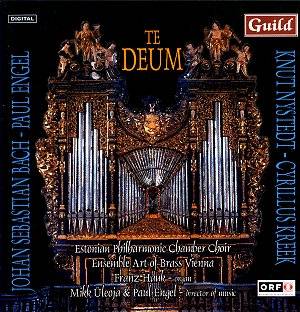This release is a rather mixed affair in which the
excellent Estonian Philharmonic Chamber Choir and the composer Paul
Engel have the lionís share. Moreover, it includes some unfamiliar works
such as the pieces by Engel and Kreekís Davidís Psalms
and the short choral work Immortal Bach by the prolific
Knut Nystedt.
Engelís imposing Te Deum for chorus,
brass, organ and percussion, an Ingolstadt commission by the way, completed
in 1988, is a quite substantial work in a highly accessible idiom. The
opening of the first section (brass repeated notes followed by a nervous
organ gesture) curiously reminds me of the opening of Kutavičiusís
oratorio Last Pagan Rites, and probably quite by
accident, I must say, though both works evoke some archaic belief. Engelís
setting is fairly straightforward and unfolds majestically, not without
grandeur expressed in simple terms.
Venezianisches Déjà-vu
for brass ensemble is a quite recent work, though it has many common
characteristics with the brass writing in the earlier Te Deum.
This is a free fantasy paying homage to the Venetian composer Giovanni
Gabrieli on whose motet Jubilate Deo and Sonata XIII it
is based. The whole, however, never sounds either as pastiche or parody,
but rather as a re-creation in 20th Century manner. Admittedly
a virtuoso piece that calls for some considerable prowess and assurance
on the playersí part. Its many demands are superbly met by the excellent
Art of Brass that delivers a wonderful reading of this most attractive
work.
Kreekís Davidís Psalms for unaccompanied
chorus are very fine in spite of their comparative austerity. They are
new to me as is this Estonian-born composerís music who, incidentally,
composed an Estonian Requiem in 1927, reportedly his major
work, that still awaits its first recording.
Knut Nystedt is a prolific composer with a considerable
amount of choral music, mostly on religious texts (though he repeatedly
made choral arrangements of Norwegian folk songs), on large as well
as small scale. His Immortal Bach (based on Komm Süsser
Tod) is a clear example of his many short choral works.
Franz Hauk is his customary self again and gives very
fine readings of the Bach works, and particularly of the impressive
Toccata, Adagio and Fugue BWV 654.
The Estonian Philharmonic Chamber Choir is a virtuoso
ensemble whose undoubted mastery and constant dedication have already
been demonstrated in many other records (such as their remarkable rendering
of Veljo Tormisís large-scale cycle Forgotten Peoples
on ECM). Franz Hauk is well-known and widely appreciated for his committed
advocacy of great organ works, past and present. As already mentioned,
Art of the Brass is another virtuoso ensemble that clearly steals the
show with their superb performance of Engelís brass piece. So, bringing
them all together can but result in music-making of the highest order.
The present release, though still a mixed affair (I would have welcomed
an all-20th Century programme), should nevertheless appeal
to all interested in well-made, accessible and communicative choral
music. Well worth investigating.
Hubert Culot


